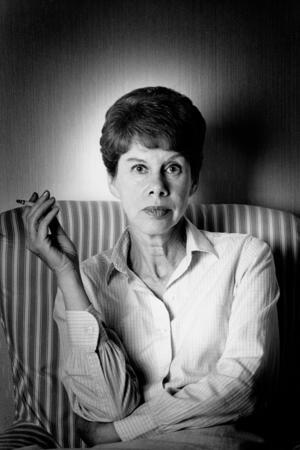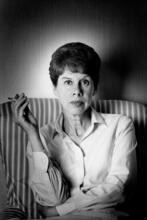Anita Brookner
Born in London in 1928, Anita Brookner studied history at King’s College and received a Ph.D. in art history at the Courtauld Institute. Brookner’s career as a prominent art historian specializing in Jean-Baptiste Greuze and other French artists led to her becoming the first woman to hold the Slade Chair of Fine Art at the University of Cambridge in 1967. Beginning her literary career in 1981, Brookner published at the rate of a novel a year. Once labelled as “the mistress of gloom,” Bookner is known for her elegant turn of phrase and elegiac description of mood. In 1984 Brookner won the Booker Prize for Hotel du Lac and in 1990 was made a Commander of the Order of the British Empire.
Early Life and Family
Born in London on July 16, 1928, Anita Brookner studied history at King’s College, London, and received a Ph.D. in art history at the Courtauld Institute. She spent some time in Paris doing post-graduate studies and in 1967–1968 was the first woman to serve as Slade Professor at Cambridge University. From 1977 to 1988 she was a Reader at the Courtauld Institute and in 1990 was elected a Fellow of King’s College.
Brookner, who said she did not wish to be “ghettoized,” deplored any “Jewish eagerness to reclaim lost souls.” Instead she preferred to be known as an “English” writer and indeed achieved fame and recognition as one of the most accomplished writers of English fiction. She is known for her elegant turn of phrase and elegiac description of mood, often a deep well of inner loneliness. She initially gained eminence in the field of art history, with a passionate espousal of French eighteenth-century painters such as Watteau, Greuze, and David. Yet few of her readers are aware of her Jewish background.
Brookner’s mother was born in England to Polish-Jewish immigrants and her father was a Polish Jew: “I think my parents’ lives were blighted—and in some sense mine is too—largely by the fact ... of being strangers in England, not quite understanding what was happening and being done to them” (interview with John Haffenden, Literary Review, September, 1984); “You’re never really free of your own history, are you?” (interview with Paul Bailey, BBC, 1988); “I have never learned the custom of the country, because we were Jews, tribal and alien” (Olga Kenyon, Women Novelists Today, 1988).
Jewish Identity in Brookner’s Works
Many writers in Britain have been made to feel uncomfortable with their Jewishness, so it is hardly surprising to find that Brookner rarely wrote overtly about Jews. Yet her characters are often refugees who inhabit the outsider’s world of St Johns Wood. They may even have arrived as children on a train from Germany during the war (Latecomers). In Brookner’s first novel, A Start in Life (1981), Ruth Weiss’s grandmother has “a sad European past,” is surrounded by the dark, heavy pieces of furniture brought from Berlin and enjoys, as a source of warmth and security, the food she knew back home—buttermilk, rye bread, caraway seeds, cucumbers. John Skinner has highlighted Brookner’s concern with food, seeing the shared meal as a form of communion (The Fictions of Anita Brookner: Illusions of Romance, 1992). A Jewish critic would have no difficulty in also perceiving the significance of food as the primary achievement of the nurturing Jewish mother. The Jewish father’s duty, on the other hand, is to provide spiritual sustenance (in Brookner’s novels, via the book). In many of her fictions, the steady father-figure is a kindly bookseller who, significantly, learned his trade and acquired his stock in Europe, in the old country. The Weiss family has not yet become much Anglicized (Georg is now George, as Meyer becomes May in Visitors.) The alienated and introspective narrator is forty-year-old Dr. Ruth Weiss, her carefully chosen name suggesting both the biblical Ruth “amid the alien corn” and the purity of the innocent Snow-White (Weiss). Ruth’s initiation in this Bildungsroman begins with a meal in a Paris restaurant where “for the very first time she ate lobster, forbidden on her father’s side” (a reference to the laws of The Jewish dietary laws delineating the permissible types of food and methods of their preparation.kashrut which prohibit shellfish).
Brookner’s later novels disguise most reference to Jewishness, but in Family and Friends, after Sofka’s death, her son impulsively covers his mother’s looking-glass (a Jewish custom after a death) and recites from Proverbs 31.10: “What a rare find is a capable wife!” In A Family Romance, the assimilated matriarch, Toni Ferber, is nonetheless angry when her daughter-in-law attempts to have a Catholic mass said for her son. Bryan Cheyette comments that “with even Anita Brookner making explicit the Jewishness of her characters in A Family Romance … the future seems full of promise for British Jewish writing” (“Moroseness and Englishness,” The Jewish Quarterly, Spring 1995).
But in Latecomers there is no mention whatsoever of the fact that the protagonists are two Jewish Kindertransport survivors who suffer survivor guilt. We are aware of the Holocaust only in its absence. Hartmann has come to terms with survival by “consigning certain memories to the dust” and sedating himself at night to ensure untroubled sleep. But Fibich, who is troubled by haunting memories of separation from his parents at the train station, returns to Berlin in a journey to redeem the past. As he squeezes through the narrow door on his underground journey (“so like a symbolic birth that he laughed”), we are relieved that he has come through, albeit as a latecomer, to some sense of belonging and peace.
Literary Legacy
Brookner preferred discretion to disclosure. She said of Jane Austen what could as well be applied to her own writing: “I think she made a tremendous far-reaching decision to leave certain things out.” The words “Jew” or “Jewish” rarely occur in Brookner’s writing (any more than they do in Kafka’s), but it is time that she was recognized as being a quintessentially Anglo-Jewish writer. It may have proved easier for her to reach an English audience by drawing a discreet veil over her many Jewish characters. Her people are subject to doubt and dislocation, despondency and alienation; they are aware, like her, “of what it is like to be lonely, perceptive, an observer” (interview with Richard Mayne, Radio 4, October, 1984). Marc Shechner describes this condition as “ghetto cosmopolitanism,” “a frame of mind which gives rise to moods or tonalities … seen as particularly Jewish, an ambivalence towards oneself and others” (The Conversion of the Jews and Other Essays, 1990). At the same time Brookner mirrors British Jewry’s preference for keeping a low profile. Her writing epitomizes the way in which it has been easier for some Jews in Britain to assimilate within society. Yet they may find themselves with a poignant sense of loss—the loss of Jewish warmth and community—while enduring the contradictions of Lit. (Greek) "dispersion." The Jewish community, and its areas of residence, outside Erez Israel.Diaspora life.
In 1984 Brookner won the Booker Prize for Hotel du Lac and in 1990 she was awarded the C.B.E. (Commander, Order of the British Empire).
Brookner passed away on March 10, 2016, at the age of 87.
Selected Works by Anita Brookner
Novels
A Start in Life. 1981 (as The Debut, New York: 1981).
Providence, 1982.
Look at Me, 1983.
Hotel du Lac, 1984.
Family and Friends, 1985.
A Misalliance, 1986 (as The Misalliance, 1987).
A Friend from England, 1987.
Latecomers, 1987.
Lewis Percy, 1989.
Brief Lives, 1990.
A Closed Eye, 1991.
Fraud. London: 1992.
A Family Romance, 1993.
A Private View, 1994.
Incidents in the Street Laugier, 1995.
Altered States, 1996.
Visitors, 1997.
Falling Slowly, 1998.
Undue Influence, 1999.
The Bay of Angels, 2001.
The Next Big Thing, 2002.
The Rules of Engagement, 2003.
Several volumes on art history, including works on Greuze, Watteau and Jacques-Louis David.
Baxter, Gisele Marie. “Clothes, Men, and Books: Cultural Experiences and Identity in the Early Novels of Anita Brookner,” English 42 (1993).
Haffenden, John. Novelists in Interview. London: 1985.
Kenyon, Olga. Women Novelists Today: A Survey of English Writing in the Seventies and Eighties. London: 1988.
Skinner, John. The Fictions of Anita Brookner: Illusions of Romance. London: 1992.
Waugh, Patricia. Feminine Fictions: Revisiting the Postmodern. London: 1989.
© 2003 from Jewish Writers of the Twentieth Century edited by Sorrel Kerbel. Reproduced by permission of Fitzroy Dearborn, Inc., part of The Taylor & Francis Group.




